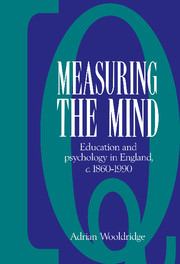Book contents
- Frontmatter
- Contents
- Acknowledgements
- List of abbreviations
- 1 Introduction
- 2 Studying childhood
- 3 The invention of educational psychology
- 4 Cyril Burt and the psychology of individual differences
- 5 Susan Isaacs and the psychology of child development
- 6 The structure and status of a profession
- 7 Mental measurement and the meritocratic ideal
- 8 The psychometric perspective
- 9 Psychologists as policy makers, 1924–1944
- 10 The measurement of merit anatomised
- 11 Equality and community versus merit
- 12 Egalitarianism triumphant
- 13 Cyril Burt and the politics of an academic reputation
- 14 Equality and human nature
- 15 The measurement of merit revived?
- 16 Conclusion
- Glossary
- Selective bibliography
- Index
6 - The structure and status of a profession
Published online by Cambridge University Press: 11 March 2010
- Frontmatter
- Contents
- Acknowledgements
- List of abbreviations
- 1 Introduction
- 2 Studying childhood
- 3 The invention of educational psychology
- 4 Cyril Burt and the psychology of individual differences
- 5 Susan Isaacs and the psychology of child development
- 6 The structure and status of a profession
- 7 Mental measurement and the meritocratic ideal
- 8 The psychometric perspective
- 9 Psychologists as policy makers, 1924–1944
- 10 The measurement of merit anatomised
- 11 Equality and community versus merit
- 12 Egalitarianism triumphant
- 13 Cyril Burt and the politics of an academic reputation
- 14 Equality and human nature
- 15 The measurement of merit revived?
- 16 Conclusion
- Glossary
- Selective bibliography
- Index
Summary
As Cyril Burt's career demonstrates, the profession was increasingly divided into two branches, each with its own body of expertise and area of competence. One was based on the universities and teacher training colleges and concerned mainly with teaching and research. Its practitioners defined academic orthodoxy and transmitted that orthodoxy to their pupils. The other was based in the school psychological services and the child guidance clinics. Its practitioners dealt with subnormal, delinquent, and difficult children, applying what they had learned in the universities and refining psychological doctrine in the process. In practice, of course, there was a considerable degree of overlap between the two branches. Academics often did some work for Local Education Authorities and usually tried to base their arguments on the evidence and experience of their more practical colleagues. Applied psychologists kept their contacts with the universities and tried to combine academic research with their more practical duties.
The organisation of teaching and research
University College, London served as the academic headquarters of educational psychology until at least the Second World War. Founded by ‘an association of liberals’ in revolt against Oxford and Cambridge, the College originally catered for modern rather than ancient subjects, for non-conformists rather than Anglicans, and for scientists rather than metaphysicians. It modelled itself on Scottish and German universities, using as its tools lectures and written examinations: much that is characteristic of professional academic life in England has its origins here.
- Type
- Chapter
- Information
- Measuring the MindEducation and Psychology in England c.1860–c.1990, pp. 136 - 163Publisher: Cambridge University PressPrint publication year: 1994



